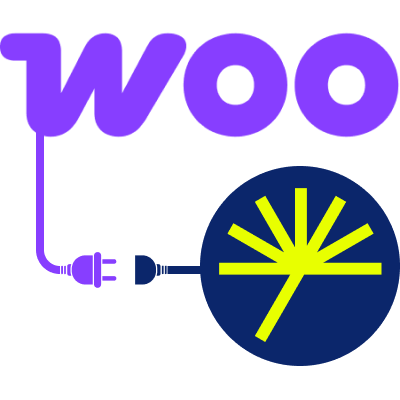24 July 2025
9175
20 min
5.00
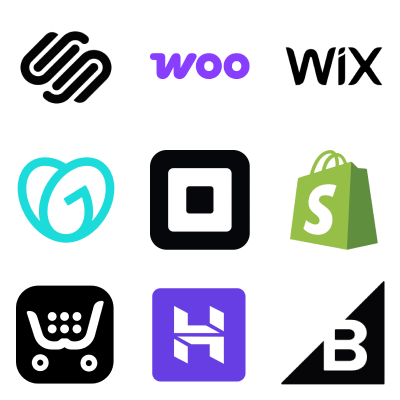
10 Best Ecommerce Platforms for Small Business
Content
Modern entrepreneurs have an abundance of options for where to build their store. It’s no wonder that choosing the right one can quickly become overwhelming. The good news is that the right tools make it simple for any small business to start selling online with little technical hassle.
In this guide, we’ll give you a clear look at the contenders for the title of the best ecommerce platform for small business. We’ve evaluated the most popular ecommerce platforms based on their features, pricing, and real-world use cases. Our goal is to give you the information you need to find the perfect fit for your small business ecommerce venture and start growing your brand online.
What are Ecommerce Platforms?
Ecommerce platforms are complete toolkits that help you build and run your own online store. In simple terms, they are software solutions designed specifically for selling products or services on the internet.
Their core purpose is to give you everything you need in one place. This includes tools to create a professional-looking online shop, add your products with photos and descriptions, manage your stock, and securely accept payments from buyers. Instead of having to create everything from scratch, a good platform handles the technical heavy lifting. This lets owners focus on expanding their business.
10 Best Ecommerce Platforms for Small Business in 2026
Now that you know what these tools do, it’s time for us to find the right one for you. We’ve compared the top providers to create this list of the best ecommerce platforms available today. Each one has been chosen for its specific strengths and the value it offers to small businesses, from ease of use to powerful sales features. And the first one is none other than…
Shopify
Shopify is often the first name that comes to mind among the best ecommerce platforms, and for good reason. It’s a powerful, all-in-one solution built for businesses that plan to grow. Its interface is clean and user-friendly, making daily tasks like adding products, managing orders, and tracking sales straightforward, even for beginners.
- Pros: Quality sales tools, highly scalable, huge app marketplace (over 8,000 apps), and 24/7 customer support.
- Cons: Monthly costs can increase with paid apps, and deep theme customization may require knowledge of Shopify’s coding language, Liquid.
- Key functions: With Shopify, you get dependable tools for selling on social media and marketplaces, advanced inventory management, customizable checkout pages, and integrated payment processing through Shopify Payments.
I want to boostreinvigorate my Shopify store marketing
- Price: pricing plans include Basic (€33/month), Grow (€88/month), and Advanced (€384/month) when billed monthly. Typical credit card transaction fees are around 2.1% + €0.30 per transaction for online payments.
- Best for: Ambitious sellers who need a reliable, and scalable platform to grow their online business. For a deeper look, check out our complete Shopify guide.
Integration with Yespo is a simple and convenient solution that connects your Shopify store with an omnichannel CDP. This integration enables real-time synchronization of customer data, orders, carts, and viewed products, allowing you to launch personalized campaigns such as abandoned cart messages or behavior-based segmentation. Marketers gain access to unified customer profiles, communication channels like email, SMS, push, and In-App messages, as well as AI-powered automation tools—all of which significantly boost efficiency and save time.
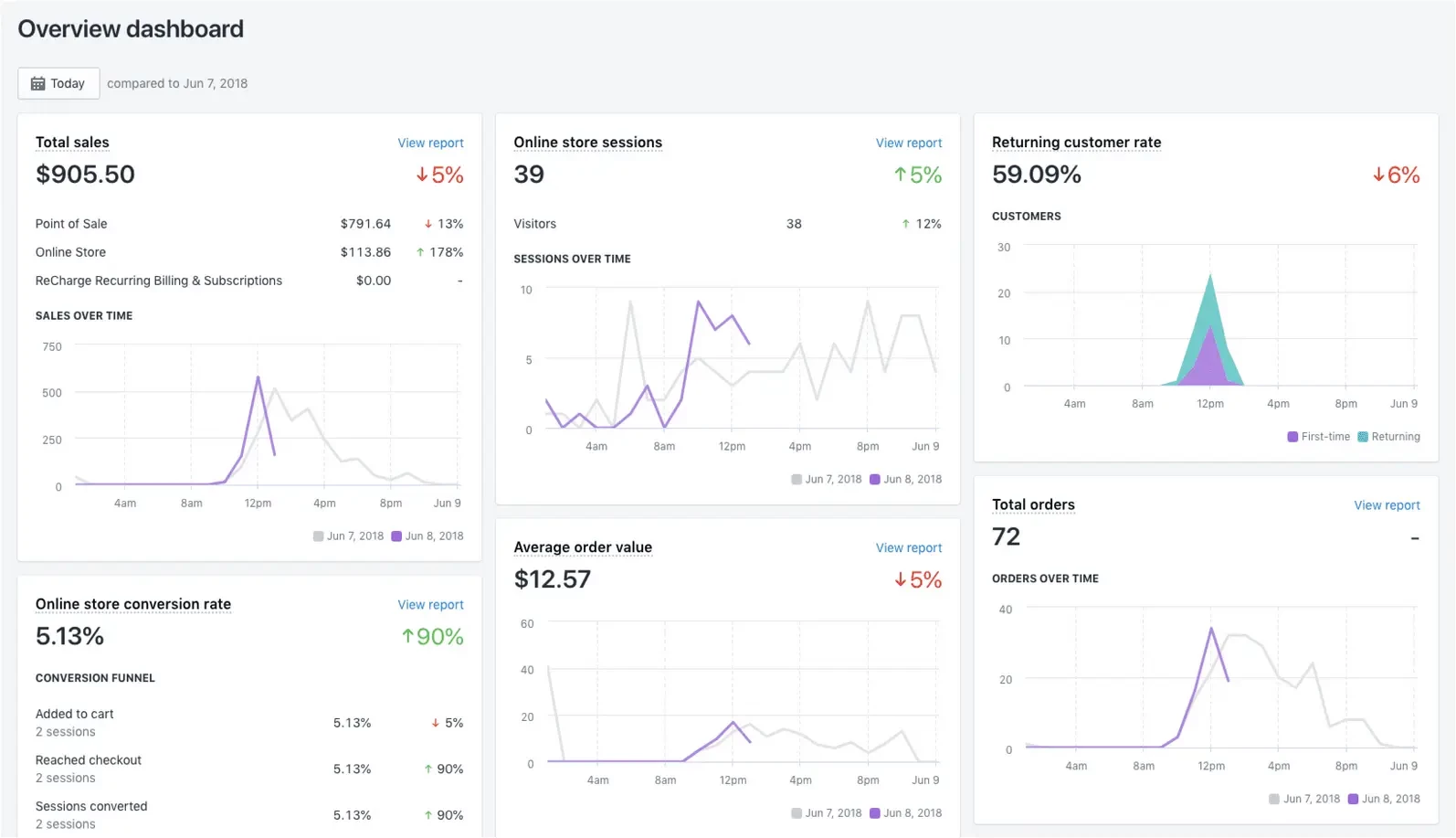
WooCommerce
For those leaning towards WordPress, WooCommerce is one of the most flexible ecommerce platforms available. It’s a free, open-source plugin that turns an existing site into a full-fledged ecommerce website. This approach gives users complete control but requires more hands-on management, as they’ll be responsible for their own hosting, security (like SSL certificates), and updates.
- Pros: The core software is free, it offers unlimited customization, and customers have 100% control over their data with no platform transaction fees.
- Cons: It has a steeper learning curve, and costs for hosting and premium extensions can add up.
- Key functions: WooCommerce provides robust product management, access to a massive library of extensions for any use case, and WordPress’s excellent SEO tools. WooCommerce shortcodes provide additional flexibility.
- Price: The plugin is free, but users must budget for a domain, hosting, and any premium themes or extensions.
Yespo integration:
You can significantly improve WooCommerce’s marketing capabilities by integrating it with Yespo. Our plugin syncs your store’s data, allowing you to use a reliable customer data platform to set up AI-powered product recommendations, launch targeted email campaigns, and build precise customer segments.
- Best for: Tech-savvy business owners who want full control and customization, or anyone already running a WordPress site. To learn more about the platform's capabilities, read our WooCommerce guide.
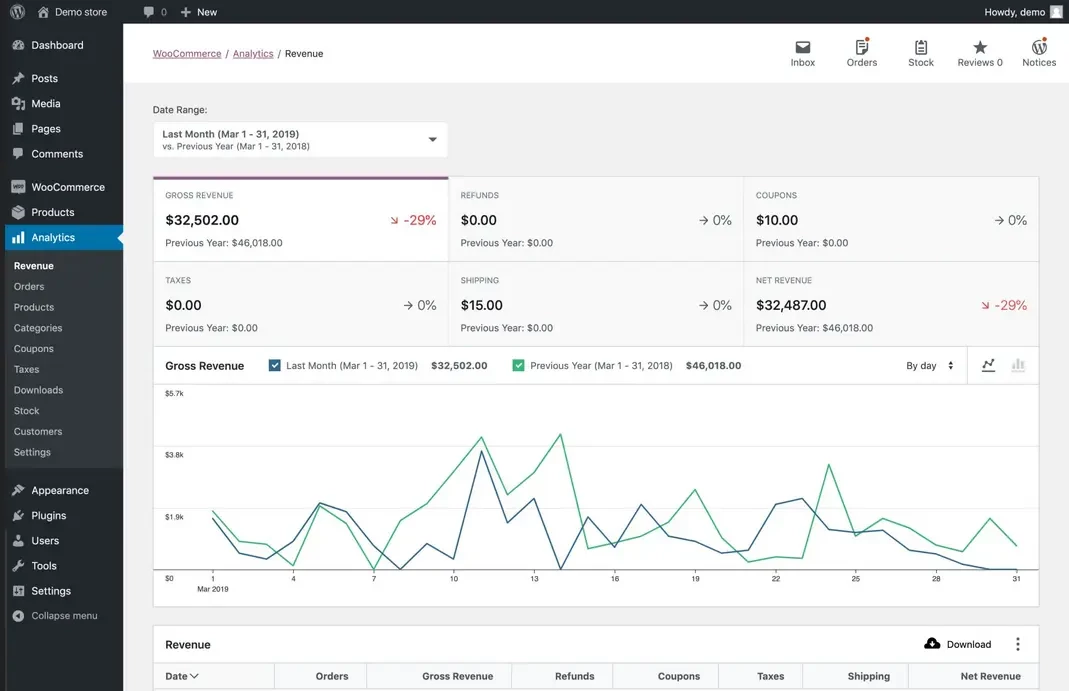
Wix
Wix is one of the most popular ecommerce solutions for small businesses that want more than just a store. It excels as an all-in-one website builder with strong ecommerce functionality built in. Its main draw is the incredibly simple drag-and-drop editor, which makes updating feel like a breeze. For business owners who prefer to have everything in one place, the unified dashboard for managing their site, marketing, and sales is a major draw.
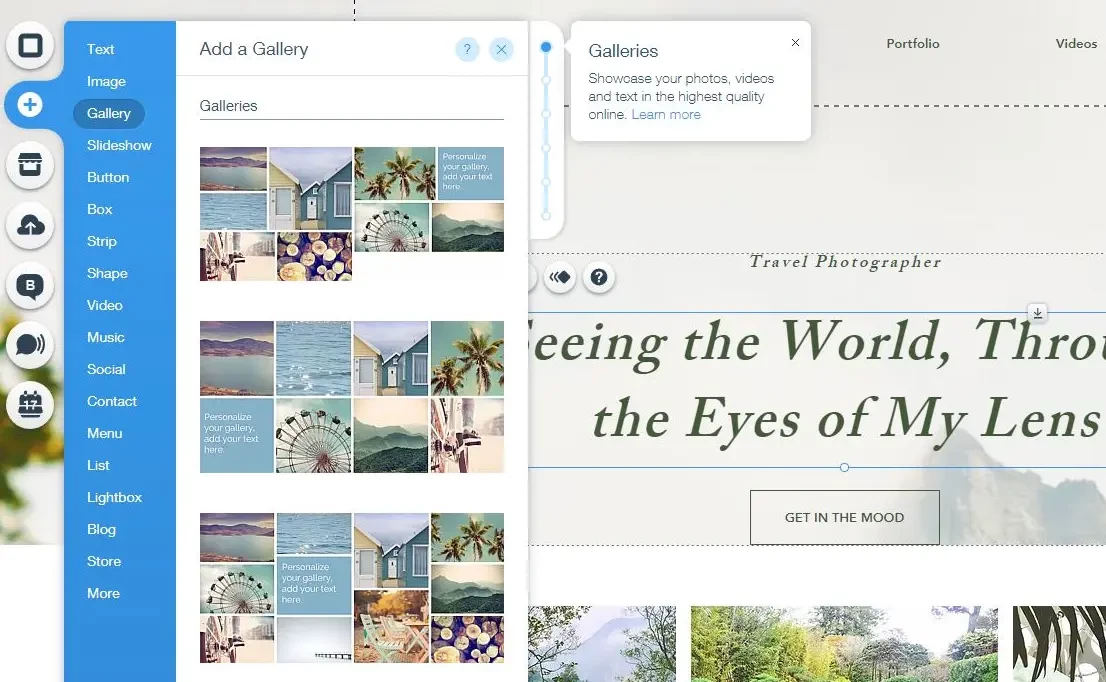
- Pros: Extremely user-friendly editor, over 900 templates to choose from, and a strong suite of marketing and SEO tools.
- Cons: You can’t switch your template once your site is live, it’s less scalable for very large inventories than platforms like Shopify, and storage space is limited on lower plans.
- Key functions: You get an integrated marketing suite for emails and social posts, booking tools for service businesses, and integrations for multichannel selling on platforms like Facebook and Instagram.
- Price: Ecommerce pricing plans include the Core ($29/month), Business ($39/month), and Business Elite plans ($159/month).
- Best for: Small business owners who want to build a content-rich website alongside their store and need strong, built-in marketing tools without relying on apps.
Ecwid
Ecwid is a flexible ecommerce platform designed for those who don’t want to start from scratch. Its key feature is the ability to add a full-featured store on top of any existing website, blog, or social media page. This makes it an excellent ecommerce provider for those who already have an online presence. Managing the store is simple: a single, central dashboard lets users sync products and orders across the website, Facebook, and other channels simultaneously.
- Pros: It features an affordable basic plan, can be embedded on nearly any website, and charges no transaction fees on top of payment processor rates.
- Cons: The Starter plan is limited to just 5 products, advanced ecommerce features require paid upgrades, and the overall design isn’t as polished as some competitors.
- Key functions: Its core strength is embedding a store anywhere. It also provides tools for multichannel selling on platforms like Amazon and Instagram and handles automatic tax calculations.
- Price: pricing plans include Starter ($5/month), Venture ($25/month), Business ($45/month), and Unlimited ($105/month).
- Best for: Hobbyists and small businesses on a tight budget, or anyone who wants to add ecommerce to an existing website without a complete rebuild.
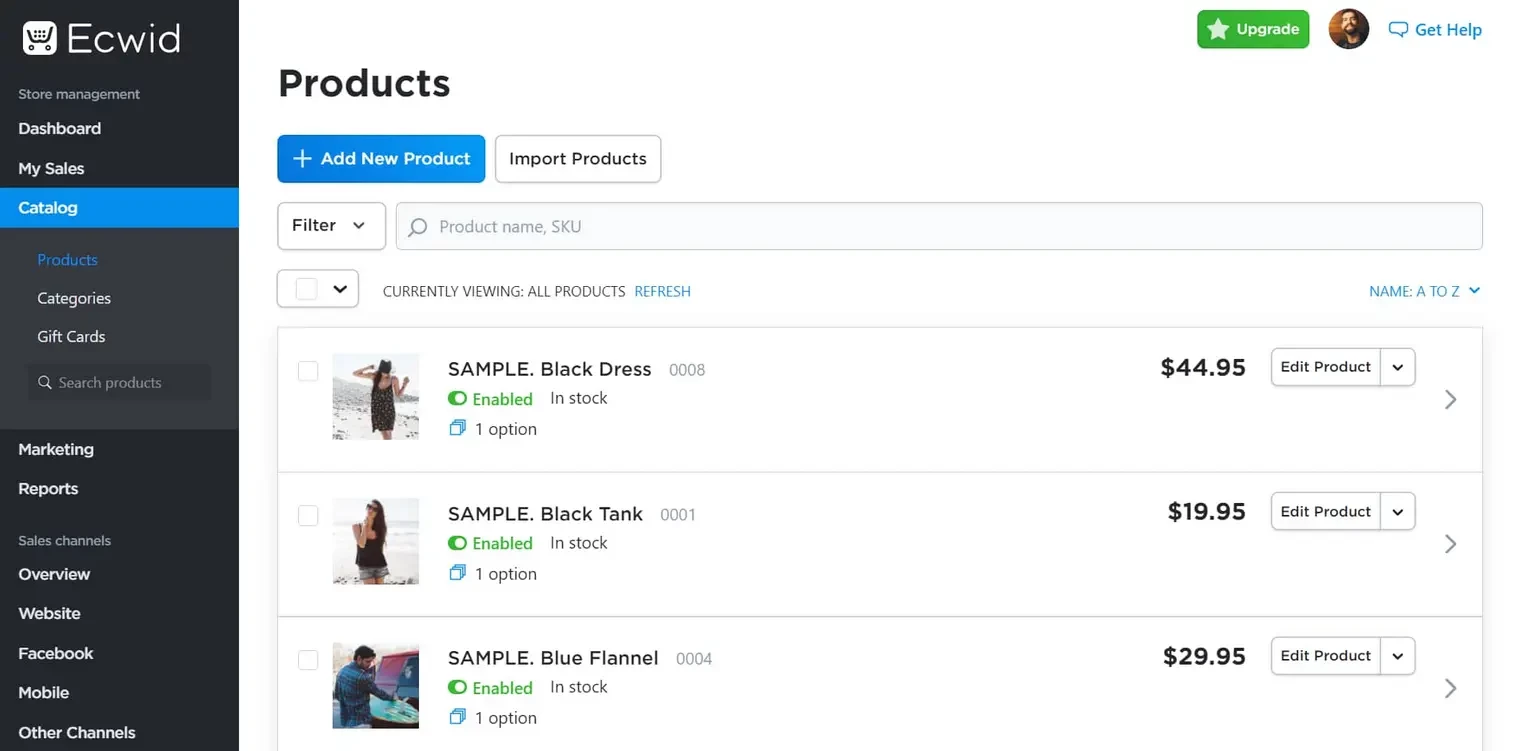
Neo Sites
Neo Sites is an AI-powered website builder designed for small businesses and individuals who want a simple way to start selling online. Instead of dealing with templates or technical setup, users describe their business, and Neo Sites generates a ready-to-use online sites in minutes. While it’s not suitable for large-scale or enterprise ecommerce, it focuses on ease of use and simplicity for getting started online.
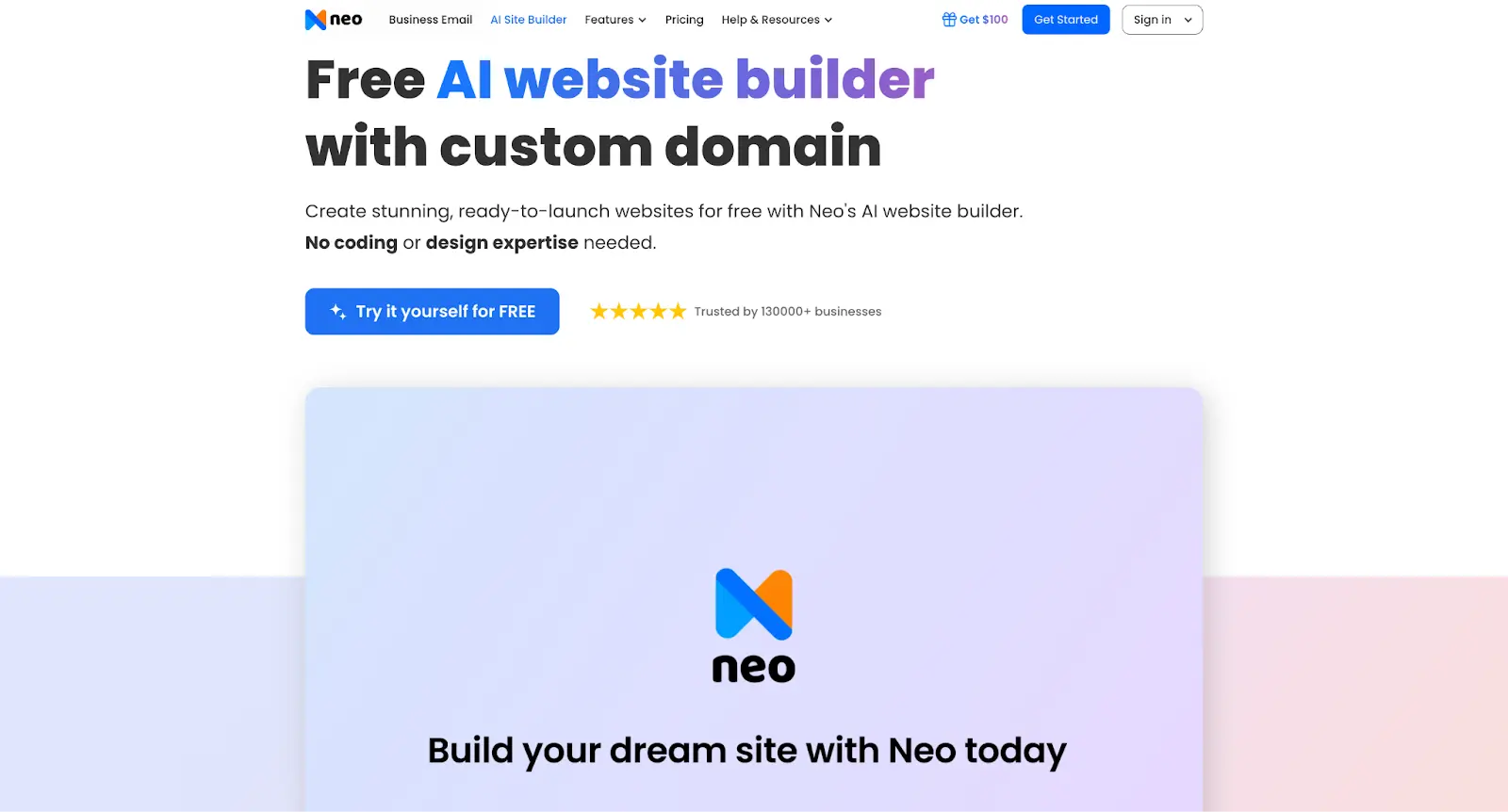
- Pros: Easy setup, AI-generated online store, no coding or design skills required, includes business email and a custom domain.
- Cons: Limited advanced ecommerce features, not suitable for large inventories, and fewer third-party integrations compared to dedicated ecommerce platforms.
- Key functions: Neo Sites offers AI-powered site creation, mobile-responsive sites, basic product management, simple customization options, built-in contact forms, and bundled business email with a free custom domain.
- Price: Free website creation is available. Paid plans start at $3.59/month (billed yearly) and include additional features along with business email and a custom domain.
- Best for: Small businesses, solo businesses, and first-time online store owners who want a straightforward way to launch and manage an online store without technical complexity.
BigCommerce
BigCommerce is a versatile SaaS ecommerce solution built for businesses with their sights set on serious growth. Unlike some other ecommerce platforms aimed at beginners, this one is designed to handle complexity, from large product catalogs to multichannel sales. While it’s incredibly capable, BigCommerce has a steeper learning curve than Wix or Squarespace, with a backend geared towards managing the details of a high-volume operation.
- Pros: It has excellent built-in features, no transaction fees, strong SEO capabilities, and is highly scalable.
- Cons: It can be complex for beginners, has fewer free themes than competitors, and automatically moves you to a more expensive plan when your sales reach certain limits.
- Key functions: You get advanced inventory management, with the ability to create up to 600 variants per product, native multichannel selling tools, and built-in features for B2B sales.
- Price: pricing plans include Standard ($29/month), Plus ($79/month), and Pro ($299/month).
- Best for: Serious retailers and established businesses that need advanced features to manage a large or complex inventory without relying on apps.
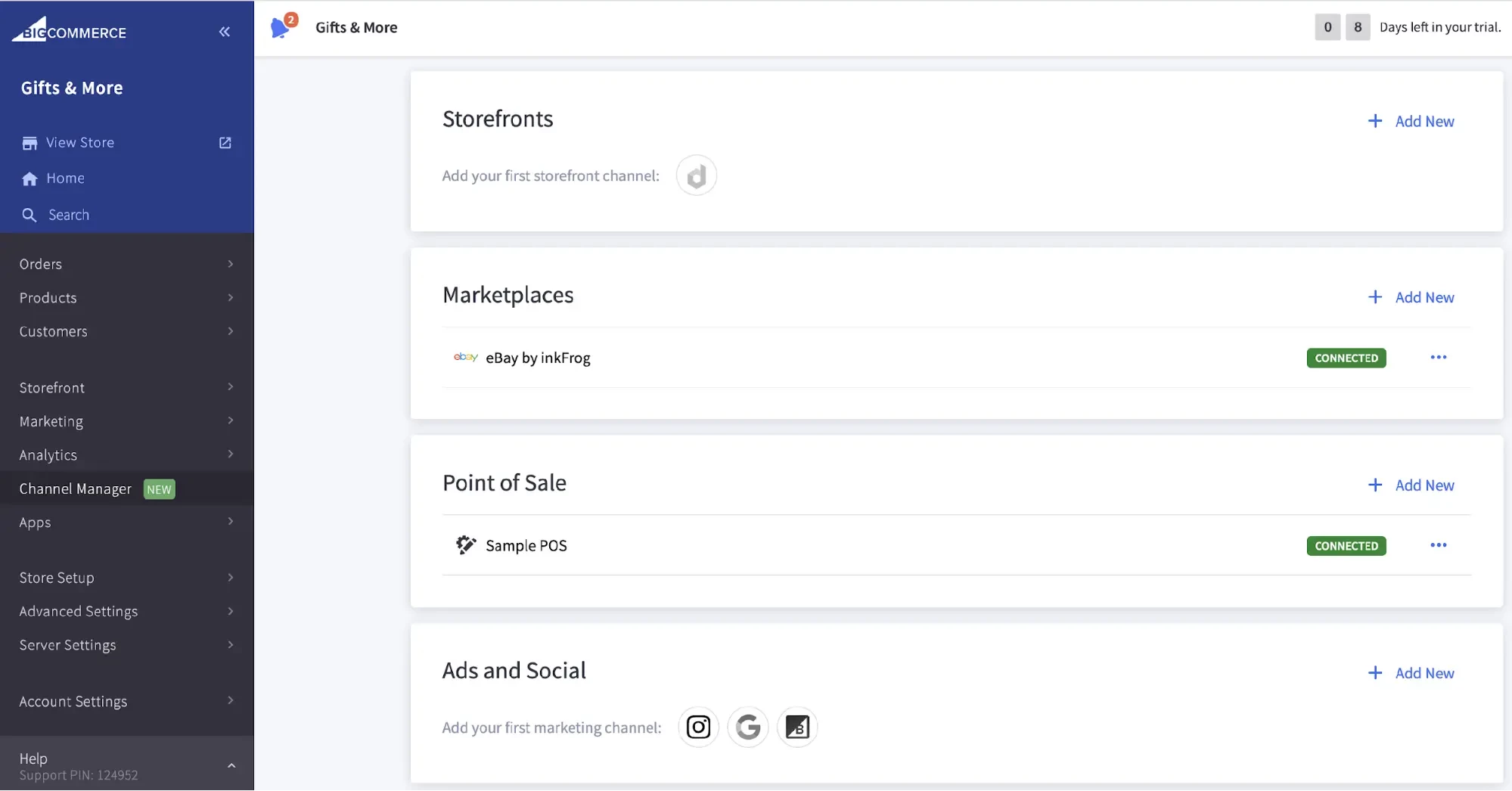
Squarespace
Squarespace is the best ecommerce website builder for brands where looks matter most. It is known for its stunning, award-winning templates and strong visual appeal. Creating an aesthetic site is simple thanks to its intuitive, beginner-friendly drag-and-drop editor that gives you creative control without being overwhelming. While it’s one of the best ecommerce platforms for design, its primary focus isn’t on high-volume selling.
- Pros: Award-winning designs, very easy to use, and strong tools for selling services and appointments.
- Cons: It has limited third-party integrations compared to Shopify, charges transaction fees on its lower-tier plans, and has fewer deep ecommerce features than dedicated platforms like Shopify.
- Key functions: The platform stands out with its appealing templates, an integrated booking system, and tools for selling physical products, digital goods, and subscriptions.
- Price: Ecommerce features are available on its Business ($23/month), Basic Commerce ($28/month), and Advanced Commerce ($52/month) pricing plans.
- Best for: Creatives, artists, designers, and service-based businesses who prioritize a strong visual brand over complex, high-volume sales features.
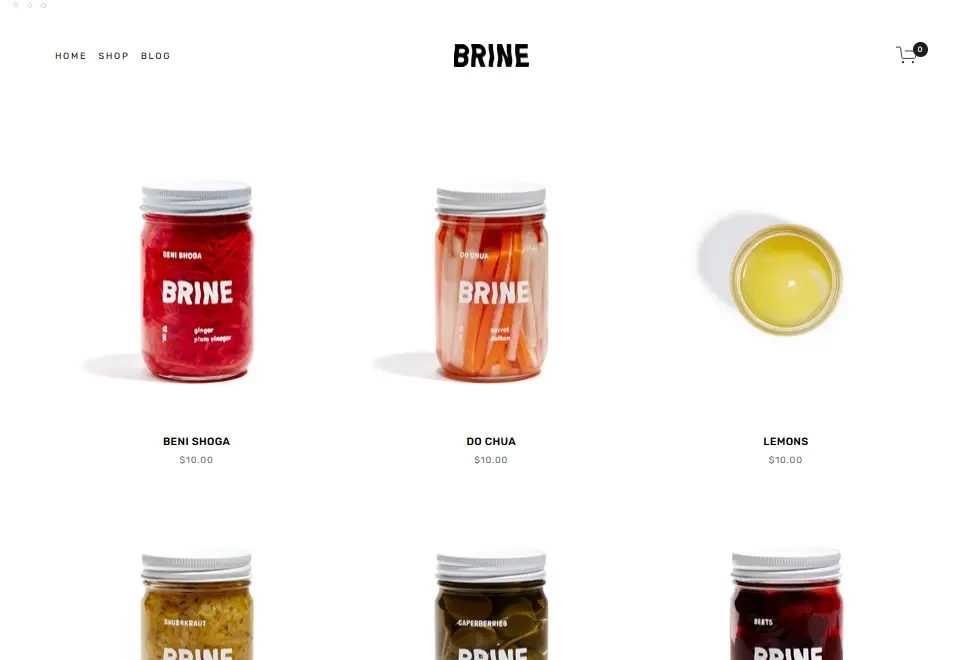
Square Online
For businesses that already use Square’s point-of-sale (POS) system in person, Square Online is the ideal ecommerce solution. Its main benefit is the seamless integration between the physical and online stores. This creates a single, unified system where the inventory, orders, and customer data sync automatically, preventing stock mismatches between online and in-person sales.
While it may not be the best ecommerce website builder for purely online brands, it’s one of the best ecommerce platforms for brick-and-mortar businesses.
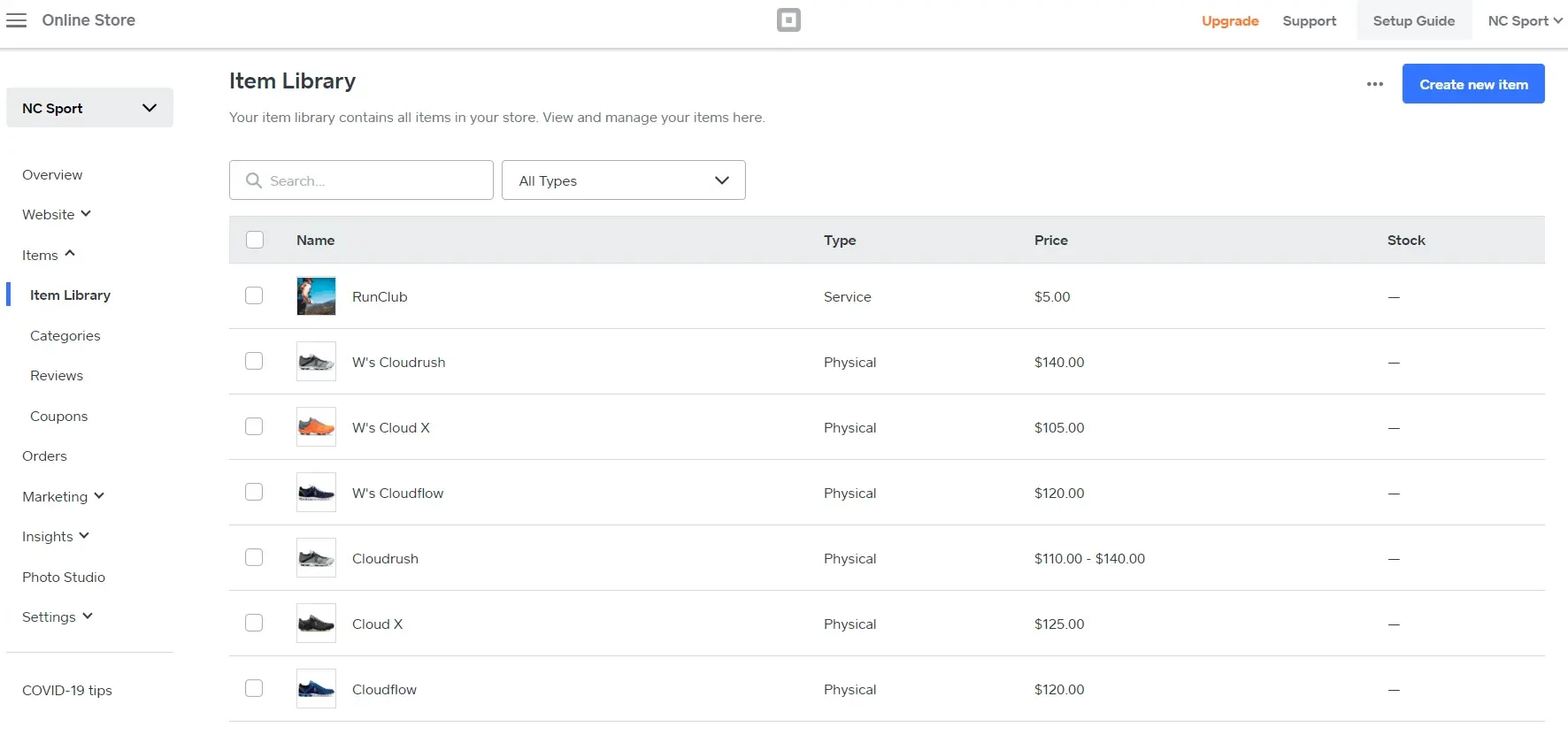
- Pros: Excellent integration with Square POS, a free plan is available, and the entire setup process is simple.
- Cons: Design customization is limited, it’s not ideal for ecommerce-first businesses aiming to scale internationally, and the marketing tools are basic.
- Key functions: The platform excels at synchronized inventory management, providing options for online ordering and in-store pickup, and ensuring a simple website setup.
- Price: Pricing plans include a Free plan, a Plus (from $29/month), and a Premium plans (from $79/month), with the free option offering incredible value for getting started.
- Best for: Restaurants, cafes, local retailers, and service businesses with a physical presence that want to add an online ordering or shopping component easily.
Hostinger
Hostinger stands out among ecommerce platforms as a top budget-friendly option, known for its fast hosting and simple, AI-driven website builder. It’s designed for users who want to get an online shop up and running quickly without a lot of technical setup. The focus here is on speed and simplicity, making it a streamlined and lightweight yet functional platform.
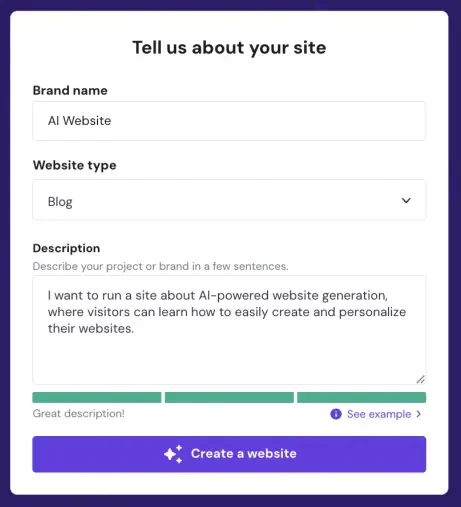
- Pros: It offers very affordable pricing plans, has some of the fastest site speeds available, and charges 0% transaction fees.
- Cons: There is only one main ecommerce plan, which limits growth. It also has a product limit of 500 items and lacks features like built-in email marketing or a large app store.
- Key functions: You get access to AI tools for site creation and SEO, a drag-and-drop editor for easy customization, and support for dozens of different payment gateways.
- Price: Hostinger offers a single Business Website Builder plan that costs as low as $3.79 per month with a 2-year commitment, making its pricing plans some of the most affordable on the market.
- Best for: Beginners, side hustles, or businesses on a very tight budget that need a simple, fast, and affordable way to start selling online.
GoDaddy
Many know GoDaddy as a top domain and hosting company, but it also offers a simple, beginner-friendly website builder with ecommerce capabilities. It’s notable among the best ecommerce platforms for its straightforwardness. The editor is not complex, making it quick to set up and manage for those with limited technical skills. As an ecommerce provider, GoDaddy focuses on getting businesses online fast.
- Pros: It’s very easy to use, has strong built-in tools for social media and appointment bookings, and is a convenient all-in-one solution if you already use GoDaddy for your domain or hosting.
- Cons: The platform offers limited design customization, its core ecommerce features are not as powerful as competitors, and it doesn’t provide the best overall value for your money.
- Key functions: GoDaddy’s strengths are its built-in marketing tools, which help you create and schedule social media content, and its integrated system for booking and managing appointments.
- Price: To sell products, you need the “Ecommerce” plan, which starts at $24.99 per month.
- Best for: Businesses that rely heavily on social media for promotion or service-based businesses that need simple booking and payment tools.
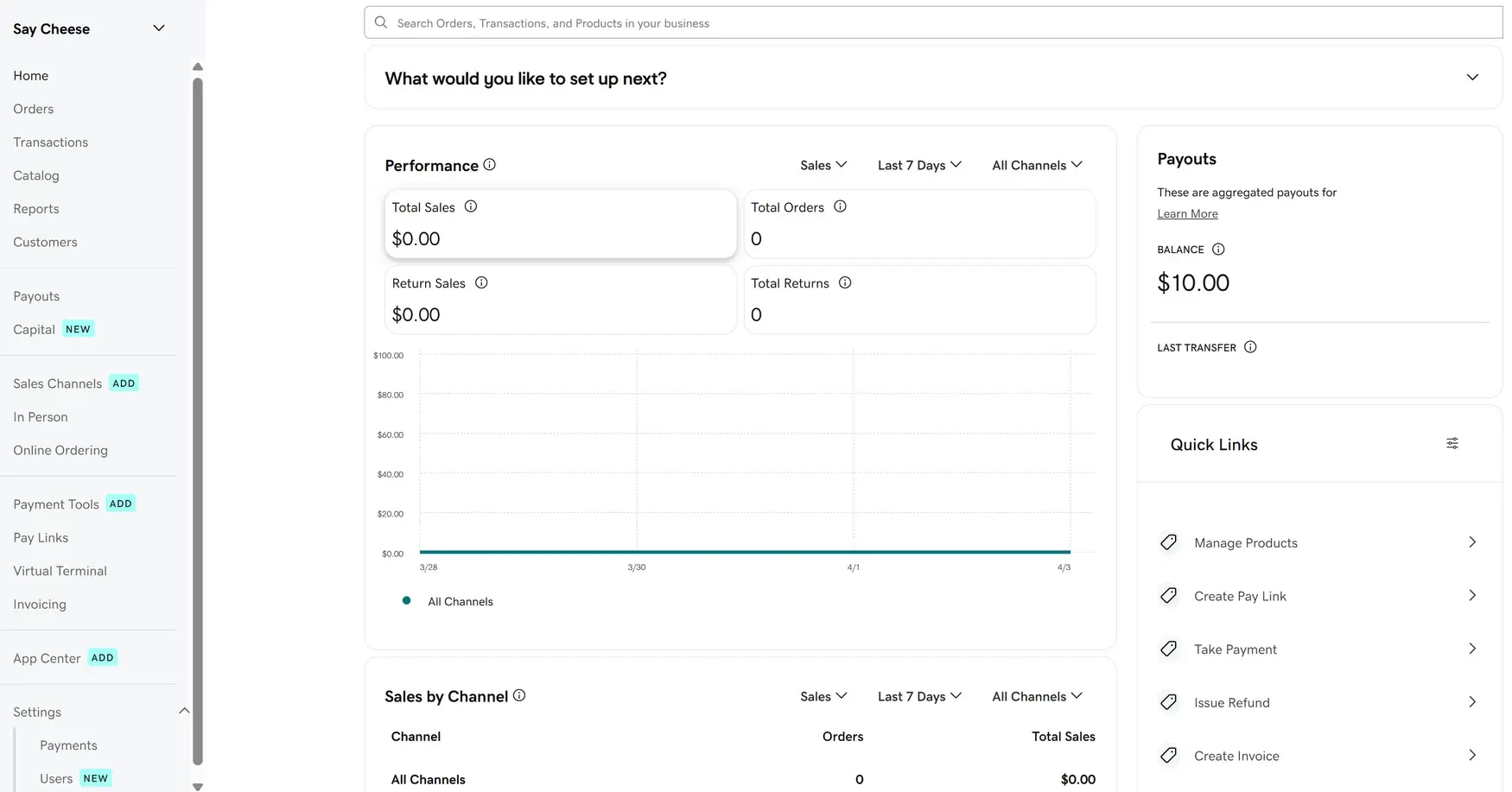
How to Choose the Best Ecommerce Platform: Key Things to Consider
Choosing the right ecommerce platform can feel daunting—to a degree, whether your business grows or not depends on it. However, you can simplify it by asking the right questions. Instead of getting lost in a sea of features, start with what your business truly needs. The best ecommerce website builder for you will align with your goals, budget, and style.
- What is your business type? Your needs change depending on what you sell. A local store going online will prioritize different features than an electronics store with a huge budget or a small apparel store. Identifying your model first helps narrow down the list of the best ecommerce platforms.
- What is your real budget? The monthly price isn’t the whole story. To understand the true cost, consider additional expenses like premium themes, essential apps, domain names, and credit card transaction fees. Some ecommerce solutions have more of these hidden costs than others.
- How much time can you commit? Be realistic about your technical skills and the time you can dedicate to maintenance. A platform like WooCommerce offers endless customization but requires you to manage updates and security yourself. An all-in-one ecommerce provider like Shopify handles this for you, saving you time.
- What are your growth plans? Think about your business growth goals. If you plan to expand your product line or sell internationally, you’ll need a platform that can easily scale with you. A solid ecommerce growth strategy starts with choosing a platform that won’t hold you back.
I want to improve my marketing
Ecommerce Platform vs. Marketplace: What’s the Difference?
When you’re starting in ecommerce or online retail, you might hear the terms “platform” and “marketplace” used interchangeably, but they are very different things. Knowing the distinction is key to choosing the right path for your business.
In simple terms, an ecommerce platform is a tool that lets you build your own, standalone online store. Think of it as building your own branded shop on your own piece of the internet. By contrast, an online marketplace is a large, third-party website, like Amazon or Etsy, where many different sellers list their products for sale in one place. It’s more like renting a booth in a giant, shared market.
While you can use both, the ecommerce platforms we’ve discussed give you far more control over your brand and business.
Here’s a simple breakdown of the key differences:
| Feature | Ecommerce platform (your store) | Online marketplace (e.g., Etsy) |
| Branding and control | You have full control over your website’s design, branding, and the customer journey. | Your store’s branding is limited by the marketplace’s layout and rules. |
| Fees | You typically pay a monthly subscription fee plus payment processing fees. | You typically pay listing fees, a commission on each sale, and payment processing fees. |
| Customer relationship | You own the customer list and can build a direct relationship with your audience. | The marketplace controls the customer relationship and owns data. |
Conclusion
With so many ecommerce platforms available, finding the right fit might be challenging. However, with this guide, it should be simpler. We haven’t covered every option out there (for example, Big Cartel or Magento), but the ones we have should provide a solid overview to get started.
The best ecommerce platform will always be the one that best fits your specific business needs, budget, and technical comfort level. The differences between the best ecommerce platforms show that what works for a small solopreneur may not work for a rapidly growing ecommerce startups.
That’s why it’s so important to take advantage of the free trials that most providers offer. There is no better way to know if a platform is right for you than to test it yourself before committing.
Making the right choice creates a strong foundation for your store’s growth. It allows you to create a better shopping experience for your customers, and once your store is running smoothly, you can focus on growth by using advanced tools like a customer data platform to understand your audience and drive more sales.
If you’re ready to take this next step, fill out the form below, and our experts will help you find the best approach to kick your marketing into high gear.
